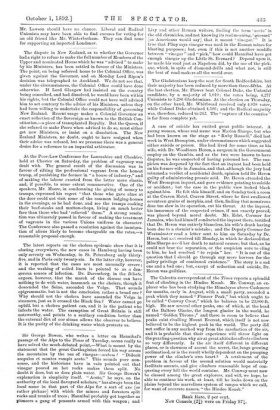Sir George Bowen, who writes a letter on Hannibal's passage
of the Alps to the Times of Tuesday, seems really to have solved the much-debated point,—What is meant by the statement that the great Carthaginian forced his way across the mountains by the use of vinegar—acetunt ? " Diducit scopulos et montes rumpit aceto." This sounds pure non- sense, and the historians have in vain pointed out that vinegar poured on hot rocks makes them split. No doubt it does, but so does plain water. Sir George Bowen's explanation is simplicity itself. " Aceto," he says, on the authority of the local Savoyard scholars, " has always been the local name in that part of the Alps for a sort of axe [or rather pickaxe] with which the miners and foresters split rocks and trunks of trees ; Hannibal probably got together as pioneers a gang of peasants armed with this weapon ; and Livy and other Roman writers, finding the term aceto' in the old chronicles, and not knowing its real meaning, guessed' [as Americans would say] that it meant vinegar.' " It is true that Pliny says vinegar was used in the Roman mines for blasting purposes ; but, even if this is not another muddle between " vinegar " and " pick," how could Hannibal have got enough vinegar up the Little St. Bernard ? Depend upon it, he made his road just as Napoleon did, by the use of the pick- axe, which, in spite of diamond-drills and what not, is still the best of road-makers all the world over.


































 Previous page
Previous page